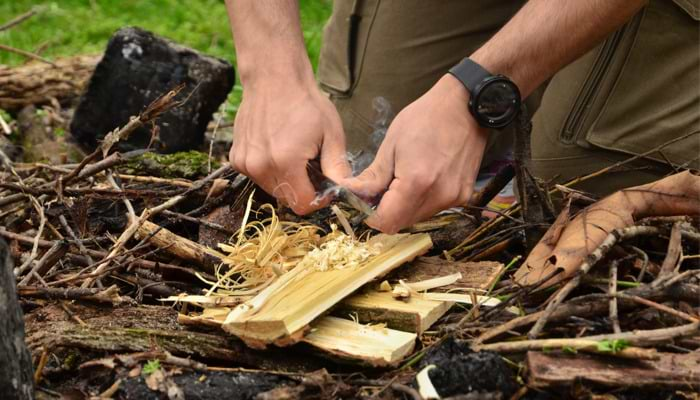
© vitrolphoto / Shutterstock.com
Bushcraft seems to be the latest trend sweeping the UK, thanks to survival reality shows such as Running Wild with Bear Grylls, Survivor and Man vs Wild. The term refers to a wide spectrum of skills, ranging from those needed for an off-grid holiday to actually living in the bush. When it comes to practicing bushcraft, the law governs what you can and can't do in the UK. Access is the biggest issue, as much of the land is privately owned, or belongs to local authorities. The Countryside and Rights Of Way Act 2000 marks out accessible land in England and Wales. The Land Reform (Scotland) Act 2003 set the rules north of the border, while Northern Ireland has only a small number of public rights of way, with access largely dependent on landowners. You will also need the landowner's permission to light a campfire, as it can easily blaze out of control. Why should you learn bushcraft? If you're intrigued by the great outdoors and plan to spend time under the stars, you should learn at least some bushcraft skills such as building a shelter, keeping warm and having enough to eat. Being outdoors can have many physical and mental benefits, especially after many of us have been cooped up indoors for long periods due to the pandemic. I don’t think anyone can deny that a more active lifestyle and spending time outdoors can boost our physical and mental wellbeing. In addition, bushcraft, mental health and well-being go hand-in-hand. Some bushcraft organisations are working with mental health charities and community groups to enable participants to experience the benefits of bushcraft sessions. Course organisers say bushcraft can help improve our mental health, enabling us to overcome barriers that impact our everyday life. It's well-known that spending time in green spaces can reduce anxiety and depression, sometimes reducing the need for medication, but bushcraft can also help improve low self-esteem and increase confidence, as we feel a sense of achievement when we complete tasks. This can improve our chances of success on training courses and in future employment. Occupational therapists also work with bushcraft activity providers to help people with physical rehabilitation too. A typical day's activities include shelter building, fire lighting, woodworking and pizza making in wood-fired ovens. If you're planning to stay in the great outdoors, you should at least do some research or training to learn the basics, such as how to find and purify natural water so it's safe to drink and how to cook al fresco. Knowing how to construct a shelter is likely to mean using a saw or a knife safely and efficiently. Never leave the blade unguarded, as this could lead to a serious accident if you fall, or if you pick it up without thinking and grip the sharp end by mistake. What should you learn about the wilderness? If you fancy a stint at being at one with nature; the key considerations are reading up on the weather in advance and ensuring you have enough to eat for the duration of your outdoor adventure. In autumn, the weather will be a major factor that contributes to the comfort of living in the bush. Considering the amount of rain in the UK, you'll come to understand the importance of learning to make a waterproof shelter! Fresh water is vital to anyone's survival. Although bottled water is the norm, brush up on techniques such as collecting rainwater in open containers should you run out. The simplest way of purifying water is by boiling it, hence the importance of having a gas-powered stove to boil a kettle or pan. The essential bushcraft gear Aside from items such as tools, blankets, cooking utensils, water containers and a first aid kit, a very important consideration is warm clothes. Even if you feel warm during the day, it can get very cold at night. You will need warm trousers, jumpers, a thick coat, socks, sturdy boots and a hat and gloves. Wear several layers, such as a t-shirt under a jumper and gilet, to help keep the heat in. Make sure your footwear is waterproof and comfortable. Carry your items in a waterproof rucksack, backpack or holdall, so you don't end up with wet clothes to change into. People who advocate bushcraft and the great outdoors believe it should be accessible to everyone to some degree. This is why it's not wise to closely define the term bushcraft, as this can reduce its appeal and make it sound too exclusive. While certain people deem themselves to be true bushcrafters, others see it more as a hobby. It can be useful for everyone and we can't all be experts, but it can certainly be handy to learn the basics.




